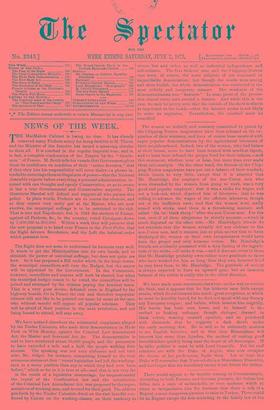The women so unfairly and unwisely committed to prison by
the Chipping Norton magistrates have been released on the ex- piration of their sentence, and have of course been received with eager popular demonstrations by the agricultural labourers of their neighbourhood. Indeed, two of the women, who had babies at their breast, seem to have been treated with needless rigour, and to have been refused the proper food for their infants,—and this statement, whether true or false, has more than ever made them into martyrs. On the other hand, the friends of the Chip- ping Norton magistrates have put out a defence of their conduct,' which comes to very little, except that it is asserted that Mr. Hambidge, the employer of the non-Union men who were dissuaded by the women from going to work, was a very good and popular employer ; that it was a strike for wages, and not a lock-out, which deprived him of labourers ; that he was willing to advance the wages of the efficient labourers, though not of the inefficient ones ; and that the women were really armed with sticks, used them in a threatening manner, and called "Ba, ba! black sheep ! " after the non-Union men. For the rest, even if all these allegations be strictly accurate,—which is much disputed on the other side,—Mr. Hambidge's friends do not maintain that the women actually did any violence to the non-Union men, and it remains just as plain as ever that to have discharged the women on their own recognisances would have been the proper and only humane course. Mr. Hambidge's friends are evidently possessed with a deep feeling of the ingrati- tude of the strike,—if strike it was,—and it does not occur to therm that Mr. Hambidge probably owes rather more gratitude to those who have worked for him so long, than they owe, however kind he may have been, to Mr. Hambidge. The gratitude of society is always expected to have an upward gaze, but an immense balance of the article is really due in the other direction.


































